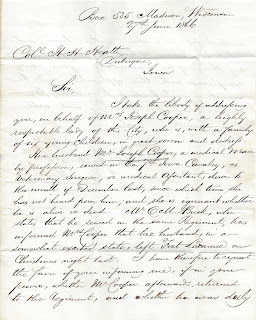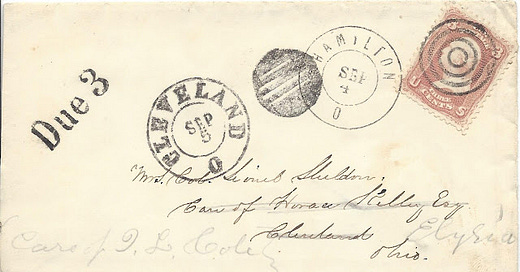Forward! - Postal History Sunday
Welcome to Postal History Sunday!
I feel like I've been saying this a lot lately, but I've had another busy week. But, here we are with another PHS for everyone to read. This week, I'm going to go with a shorter entry that is actually going to lead to next week's PHS! A series! So, let's get started, shall we?
A week ago, I had the opportunity to attend the Great American Stamp Show in Cleveland. While I was there, I enjoyed looking through many pieces of postal history and I was able to identify some that I wanted to add to my own collection. And, of course, I selected many of these items simply because I could already see that they would work well in a Postal History Sunday!
Today, I wanted to work on the theme of mail that is sent to one location, but the recipient has moved on - for whatever reason. If the new location of the recipient is known, that letter could be forwarded to the next location.
But, the rules for forwarding changed over time. During the 1860s, the period I study the most, there were some definite changes with respect to forwarded mail.

Forwarded mail - the recipient pays at delivery
Shown above is a letter that was likely mailed in September of 1863 or 1864, clearly during the US Civil War, from Hamilton, Ohio. The original destination was in Cleveland, but the letter was forwarded to Elyria, Ohio. The cost to mail a letter inside the United States was 3 cents per one half ounce and a three cent stamp paid the cost to mail the letter from Hamilton to Cleveland. However, forwarding was not free - and three more cents were needed to send the letter from Cleveland to Elyria.
That's where the "Due 3" marking comes in. Applied in Cleveland, this marking let the postmaster in Elyria know that Mrs. Col. Lionel Sheldon would need to pay three cents when she, or her representative (I.L.Cole) received the letter.
The US Postal Regulations in effect at the time gave instructions in Section 55 for forwarding mail stating that "It is proper to forward a letter when duly requested ... If it has been delivered according to its address, and then forwarded, it must be charged with additional postage ... [which] may be paid either at the forwarding office or the office of delivery."
What we cannot be certain of with respect to this letter is whether the "request" to forward this letter came after it was delivered to Horace Kelley, Esq. or if there was a request on record with the Cleveland postmaster that they were honoring. And, as far as the postal service was concerned, that didn't really matter. Either way, the letter was sent on its way on September 5, only one day after it was originally posted in Hamilton. Either Kelley was very efficient with the request to forward after having the letter placed in his hands or there was already forwarding instructions on file. I tend to believe the latter if I had to choose.

Forwarding pre-paid
Here's an example where the cost of forwarding a letter was already paid. Reverend Mr. Willard (Samuel G. Willard) must have arranged for his mail to be forwarded to Burlington, Vermont, care of Rev E. Mix. In doing so, he appears to have either prepaid or arranged for mail forwarding to be placed on his account by his instructions. The result was that the Willimantic postmaster applied a second three cent stamp on mail to be forwarded to Rev Willard so it would be paid to the new destination.
Rev Samuel Willard served as a Congregationalist Minister in Willimantic, Connecticut, from November 5, 1849, until September 2, 1868 - a fairly long tenure. The Congregationalist church makes the claim as the first "place of worship" established in Willimantic, dedicating a church building in 1828.
This letter, sent from Milford, Connecticut, in July of 1865, would have come at a time when Willard was well established in the First Congregationalist Church of Willimantic. He might have been visiting his fellow minister, Eldridge Mix, who served at the First Congregationalist Church in Burlington.
While this letter has no contents remaining in the envelope, we can construct a bit more about it based on the dockets written sideways on the left side of the element. The docket provides notes for Rev. Willard that the letter was from a Dr. Chas Jewett and was received on July 20, 1865. That lines up nicely with the Milford July 18 and Willimantic July 19 postmarks. Willard apparently responded to the letter the next day and also sent a letter to a Rev E.H. Pratt that must have dealt with a related matter.

And then, the rules changed
So, we come to this letter that was mailed on Jun 28, 1866 from Madison, Wisconsin, to Dubuque, Iowa. The letter was forwarded on from Dubuque on July 9 to Washington, D.C. There is no additional stamp and there is no "due" marking to be seen on this folded letter. However, if you look at the top left, you will see the words "Forwarded" and "Free."
So, let's give the easy part first. According to an Act of Congress on June 12, 1866, letters were to be forwarded without additional postage cost. This new regulation was to take effect on July 1 of that same year. So, while the letter was initially mailed and likely arrived in Dubuque before the first of July, it was not forwarded until after the first. So, it qualified for free forwarding.
However, if ALL prepaid mail was to be forwarded for free, why did the Dubuque postal clerk find it necessary to include the extra markings that read "Forwarded" and "Free?" Isn't that a bit redundant?
I actually have a possible explanation for this, believe it or not. On July 24, 1861, a change in the postal laws stated that prepaid letters to soldiers in the service of the United States would be forwarded for free - likely recognizing that said soldiers were going to move around at the behest of the government, so it didn't seem right to charge them additional postage to get their letters. Therefore, post offices were probably used to pulling out handstamps for free forwarding to alert clerks at the destination office that this special rule applied.
In other words, it was no longer necessary to make the special distinction for letters forwarded to soldiers. But that doesn't mean the postal clerks were going to break procedures that had become habit that easily.
Hey... how many of you still write the wrong year on things during the month of January? For me, it's actually more like February or March when I finally get with the program. So, I can sympathize.
A teaser for next week
This folded letter actually had contents. And you know what that means - there's potential for more story!

So, next week, we are actually going to explore both the first and the third items from today's article from their social history perspectives. The letter shown above is written by a Justice of the Peace on behalf of Mrs. Joseph Cooper, who is looking for her husband - part of the 7th Iowa Cavalry.
Thank you for joining me this week, and I hope to see you next week. Have a great remainder of your day and a fine week to come!



